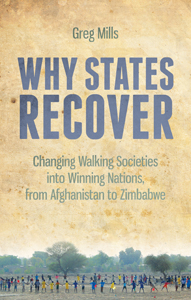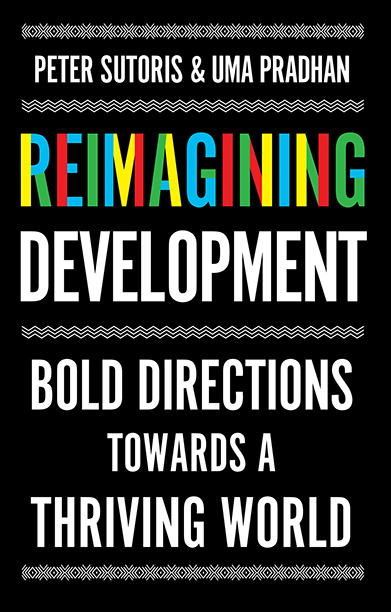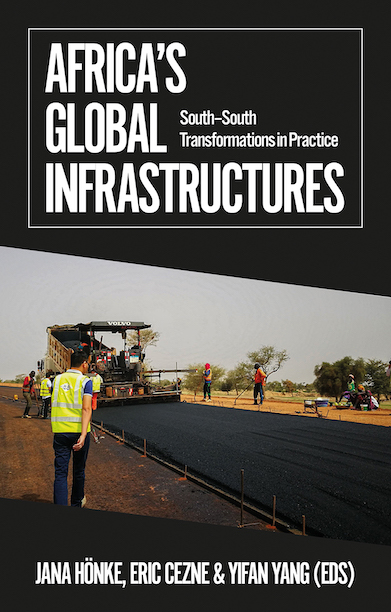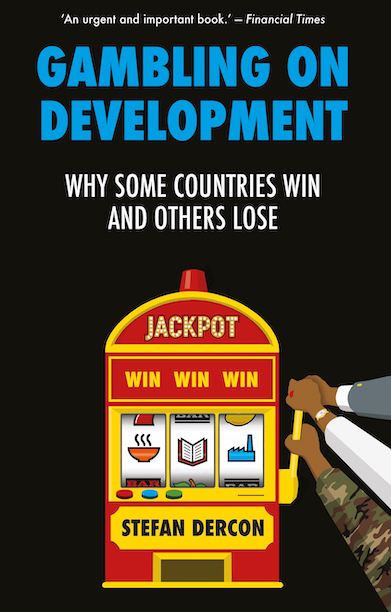Why States Recover
Changing Walking Societies into Winning Nations, from Afghanistan to Zimbabwe
‘This brilliant, heart-felt book is a blueprint to improve people’s lives. Read it, and learn.’ — Ron Suskind, Pulitzer prize-winning author of The One Percent Doctrine and The Way of the World
Description
State failure takes many forms. Somalia offers one extreme. A collapse of central authority as the outcome of a prolonged civil war, where authority descends into competing factions—headed by warlords—around the spoils of local commerce, power and international aid. At the other end of the scale is Malawi. During President Bingu’s second term in office, the country’s economy collapsed as a result of poor policies and personalised politics. On the surface, save the petrol queues, it was stable; underneath, the polity was fractured, the economy broken.
Between these two extremes of state failure are all manner of examples. Drawing on research in more than thirty countries, incorporating interviews with a dozen leaders, Mills disaggregates state failure and identifies instances of recovery in Latin America, Asia and Africa. All the while he returns to his key questions: how do countries recover, and what roles ought insiders and outsiders play to aid that process?
Table of contents
CONTENTS
Introduction
PART 1: PATHOLOGIES AND THREADS OF FAILURE
1. Argentina: Living Beyond Means
2. Guinea: A Great Balancing Act
3. Haiti: 128 Shades of Grey
4. Kenya: Off the Rails or Back on Track?
5. Nigeria: A Cauldron of Superlatives
6. Tunisia: And Other Springs
7. Uganda: Kettles, Pots and Land
8. Venezuela: An Authoritarian Democratic Playbook
9. Zimbabwe: Backwards to Beit Bridge?
PART 2: INSTANCES OF INTERVENTION
10. Afghanistan: Cycles of War and Aid
11. The Democratic Republic of Congo: The Invisible State
12. Iraq to Syria: Matching Legitimacy, Strategy and Resources
13. Kosovo: Fifteen Years of Building Peace
14. Liberia: Mission with a Long Tail?
15. Libya After Regime Change: A Michael Jackson State?
16. Malawi: A Different Sort of Leadership
17. Sierra Leone: Shrugging off Legacy
18. Somalia: The World’s ‘Most Failed’ State
PART 3: ILLUSTRATIONS OF RECOVERY
19. Angola: Giving War a Chance
20. Burkina Faso: The Mobylette African Capital
21. Burundi and Rwanda: Getting Beyond Tribalism
22. Chile to Zambia: Natural Resources – During and After the Rush
23. Colombia: Attention to Detail
24. Myanmar: The Roots of Reform
25. Singapore: Choices Behind Change
26. Somaliland: The Power of Local Ownership
27. South Africa: Components for Resolving Conflict
28. Vietnam: No Lack of Excuses
PART 4: PULLING THE THREADS
29. The Prior Question: Why Some States Fail
30. The Fragility ‘Industry’: Getting Past Routine Responses
31. Confronting Authoritarian Democracy, Managing Identity Politics
32. The Quiet Professionals: Aid, Advice and the Art of Recovery
33. The Private Sector: Melting the Iceberg and the Zen Master
Conclusion: Buy, Hold, Fix
Reviews
‘This brilliant, heart-felt book is a blueprint to improve people’s lives. Read it, and learn.’ — Ron Suskind, Pulitzer prize-winning author of The One Percent Doctrine and The Way of the World
‘The key reason behind economic failure is, Greg Mills illustrates, politics. But he also convincingly shows how they can be fixed … led by those with the most at stake: locals.’ — Paul Collier, author of The Bottom Billion
‘Seldom does a writer analyse the problem and also identify the solution. Greg Mills manages in Why States Recover both an entertainingly personal and compelling read.’ — F. W. de Klerk, former president of South Africa
‘An entertaining adventure of how states fail; an enterprising manual for their success.’ — David Kilcullen, author of The Accidental Guerrilla and Out of the Mountains
‘Up close and personal: Greg Mills seamlessly straddles a policy world divided into doers and writers.’ — General Sir David Richards
‘Greg Mills is a remarkable person — courageous, indefatigable, thoughtful and deeply experienced. He has studied state formation on the ground in some of the most difficult environments on earth. His insights are wise, pragmatic and illuminating.’ — Rory Stewart, MP, author of The Places in Between and The Prince of the Marshes
‘Interviewing rebel generals in Angola and the Congo, tracking petrol tankers in Afghanistan and on the road in Latin America and Asia’s tiger economies, Greg Mills melds compelling reportage and analysis in search of the answer to Why States Recover.’ — Patrick Smith, Editor, Africa Confidential
‘More important than understanding why states fail is grasping why they recover — and this excellent book offers practical insights gleaned from personal experience in challenging places.’ — Lieutenant General Sir Nicholas Carter, Commander: UK Land Forces, recently Deputy Commander: ISAF
‘In this sprawling inquiry into why several dozen low-income countries, mostly in sub-Saharan Africa, collapsed and why some of them subsequently recovered, Mills finds more answers in domestic politics than international factors. … Mills argues convincingly that although outsiders and foreign aid can help, without local resolve such assistance is mostly wasted. … This book is impressive in its mastery of this histories of so many countries and is clearly based on a significant amount of fieldwork.’ — Foreign Affairs
Author(s)

Greg Mills, Director of the Brenthurst Foundation, has advised African governments, and served in Afghanistan with COMISAF. His books with Hurst include Why States Recover.






